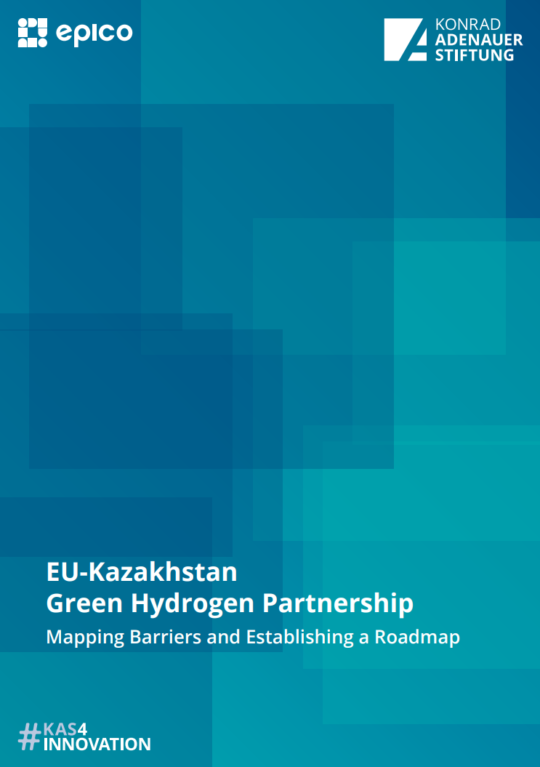Press Release
Brussels/Berlin, Wednesday 8 November: EPICO KlimaInnovation and the Konrad Adenauer Stiftung published a policy brief on an EU-Kazakhstan green hydrogen partnership, "EU-Kazakhstan Green Hydrogen Partnership: Mapping Barriers and Establishing a Roadmap". The policy brief suggests three key actions for Kazakhstan to play an important role in the EU's future energy security and decarbonisation.
Kazakhstan has acquired a new geopolitical significance for Europe following Russia's unlawful invasion of Ukraine. Enhanced cooperation between the EU and Kazakhstan could support the decarbonisation of traded goods to the EU, and potentially trade in green hydrogen (or derivatives). Astana announced plans to develop a hydrogen industry in the country, aiming both at domestic decarbonisation and future exports. The country has significant potential for developing renewable hydrogen, due to its abundant solar and wind resources.
Yet, significant obstacles remain. These include the lack of incentives to decarbonise the Kazakh economy, and the absence of local R&D&D and international transport infrastructure. Green hydrogen production also requires fresh water, which is becoming increasingly scarce in the region.
Three key actions for the EU to support the deployment of a long-term green hydrogen partnership with Kazakhstan are suggested in the policy brief:
- Design an inclusive regional sectorial cooperation.
- Launch at EU-Kazakhstan Hydrogen Incubator.
- Explore infrastructure development options.
The Policy Brief is the result of a project involving key high-level topical stakeholders, coming together throughout EPICO's and KAS' yearly first sprint of design-thinking process of the "Policy Accelerator for Climate Innovation 2023". Authors convened for a two-day workshop in Brussels on 12 and 13 June 2023, and draft results were presented at a closed-door roundtable on 11 September 2023 with key stakeholders.
Quotes
Sam Williams, EU Policy Manager, Energy and Climate, EPICO KlimaInnovation
"The EU needs to reshuffle its energy relations with third countries. Green hydrogen is essential to reach global climate targets. Kazakhstan is an example of a wider group of countries with majestic untapped renewable energy potential that can become key energy partners for the EU in the future. "
Yana Zabanova, Research Associate, Geopolitics of Transitions in Energy and Industry, Research Institute for Sustainability – Helmholtz Centre Potsdam (RIFS Potsdam)
"Kazakhstan was the first country in Central Asia to develop renewable energy. With the EU's support, it could play a similar pioneering role in clean hydrogen development in the region, paving the way for Central Asia's emergence as a future hydrogen hub."
"Closer engagement with Kazakhstan would help the EU not only to diversify its hydrogen supply chains in the future, but also to promote green technology transfer and encourage the adoption of high sustainability standards globally."
Press contact:
Saga Henriksdotter
Mobile: +32 493 97 76 90
Mail: saga.henriksdotter@epico.org
External Content from epico
Please see the privacy policy of epico if you are loading external content.

